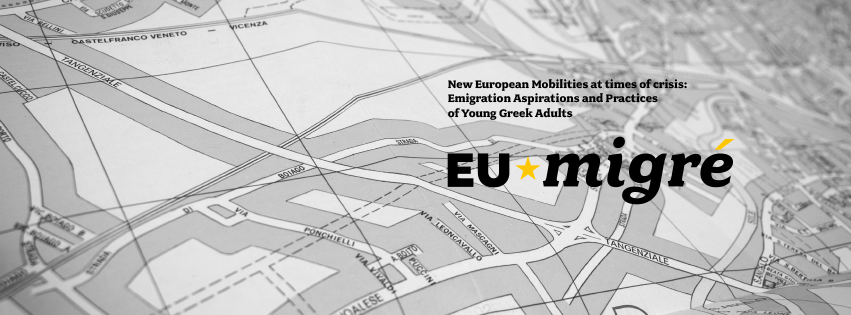“Eumigré – New European Mobilities at times of crisis: Emigration Aspirations and Practices of Young Greek Adults” is a EU funded research project on the new Greek emigration, run by Professor Lois Labrianidis*, and Marie Curie postdoctoral fellow at the University of Macedonia, Manolis Pratsinakis.
More than 350,000 Greek citizens appear to have left Greece in the past 7 years heading to various destinations primarily in Northern and Western Europe. But the crisis does not only feed the resurgence of Greek emigration in terms of volume, but also brings qualitative changes. A major transformation seems to be underway: migration is now more a matter of need rather than one of choice. Even though the motivations of “crisis” migrants are not limited to mere economic need but are rather framed in a wider context of lack of prospects in the country, as well as positive evaluations of life and work abroad, worsening conditions in the Greek labour market and concerns about employment and income are primary motives for many.
Greek migration in EU
Even if the establishment of the right to free movement, employment and settlement across the European Union for Greek citizens in 1988 allowed for unrestricted mobility, this never took the form of a major outmigration. Until recently, Greeks were notably registered among the least mobile Europeans.
However, in the context and conjuncture of the crisis affecting the Eurozone as whole, yet shaking mostly its “weakest links”, notably Greece, this seems to be gradually changing. The combined effects of recession, extreme austerity, and a generalized mistrust towards institutions and disillusionment from the political system have redefined mobility intentions in Greece. Despite the previously recorded skepticism, many Greeks were forced by the circumstances to change their views on mobility in a very short time span.
Aspirations and Practices of Young Greek Adults
There is extended media coverage of this new emigration, which is presented as an one-way option for certain population segments, notably the young and the highly skilled, and hence a drain of the most dynamic part of the country’s labour force. Despite this media attention, however, little is known about the current intensification of emigration from Greece and its characteristics, as well as the experiences of the country’s new “crisis migrants”.
This study explores the new crisis driven emigration through the perspectives of the key actors, the emigrants themselves. It aims to explore who is emigrating, what alternative mobility strategies are considered and pursued and the reasons underling migration decisions as well as the multiplicity of individual pathways abroad. The project has started in July 2015 and will run until June 2016.

Research organization and an online survey
The study sets the scene by drawing on available statistical data, including two nationwide representative surveys in Greece conducted at the University of Macedonia Regional Development Policy and Research Unit. The aim of this initial phase is to provide a global picture of the new emigration wave from Greece by assessing its size, and its regional and demographic characteristics, while exploring its pre-crisis and current dynamics.
In a second phase, 50 in-depth narrative interviews with young adults of different mobility and educational trajectories are being conducted in London and the Netherlands. Through those interviews the study aims to uncover the mechanisms that shape emigration aspirations and mobility practices, highlighting the various complex structural and individual factors at play and the ways they interact in the biographies of the respondents. We explore the conceptualization of emigration among the key actors (is mobility framed as a success or a failure? and by whom and in what context?), the experiences of those who have emigrated, feelings of belongingness, the development of transnational ties, the flow of remittances, and the impact of emigration on families and gender relations.
As part of the research an online survey is conducted in the Netherlands and London. Here respondents may find information (in Greek) about the methodology and participation
Short-term pain/long-term gain?
Lois Labrianidis, and Manolis Pratsinakis suggest concrete policies that could be implemented in the shorter and medium term. These are proposed as a means of alleviating the negative consequences of the phenomenon, and potentially turning the situation into an opportunity for the restructuring of the country in the future, provided that a viable and realistic agreement is reached in respect of Greek debt and austerity policies are abandoned. It is suggested that, in the current circumstances, this could not be done by focusing on a repatriation policy, since return in the short term is neither part of the plan nor an aspiration for most of the emigrants. Instead it could be done through establishing different means of cooperation, leading to the development of viable and sustained transnational ties between the expatriates and the Greek society and economy.
*University of Macedonia Professor Lois Labrianidis is General Secretary for Private and Strategic Investments at the Ministry of Economy, Infrastructure, Shipping and Tourism.
Read more via Greek News Agenda: Greece’s Νew Emigration at Τimes of Crisis
Watch Manolis Pratsinakis speaking about “Social constraints and the decision to leave: Emigration from Greece at times of crisis” at SEESOX – South East European Studies at Oxford (February 2017):
Ν.Ν.












